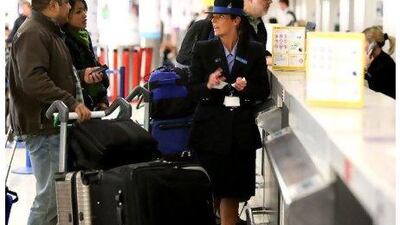Icelandic volcanic eruptions are again threatening to shut down European airspace.
Although conditions began improving late yesterday, the situation mirrored the eruptions last year that caused US$1.7 billion (Dh6.24bn) in damage to the airline industry.
Safety officials in Scotland and Germany have restricted flights as the Grimsvotn volcano continued spewing ash clouds up to 12km high.
Middle East airlines were heavily affected last year, and this year's ash event comes at a time when the busy summer travel season to Europe begins. This year is also a key period for Etihad Airways, which is banking on sustained robust demand to reach its financial break-even point.
In a positive development, scientists say the latest eruptions appear less dangerous and meteorological conditions are beginning to improve.
"It's not over," Pall Einarsson of the University of Iceland told the Associated Press agency. "But it's declining rapidly." Similarly, data from the UK Meteorological Office showed ash densities over northern Germany were dissipating, while the London Volcanic Ash Advisory Centre reported yesterday that according to preliminary data, it appeared the "eruption may have ceased". The "plume is not visible on the radar", it added.
Clearing skies have led to flights being allowed to resume in Bremen, Germany, yesterday, with flights out of Hamburg and Berlin also expected to start up again later in the day. Ash particles have been known to damage airliners in flight leading to engine failure and impairing aircraft exteriors and control instruments.
In March last year, Middle East carriers such as Emirates Airline, Etihad Airways and Qatar Airways lost tens of millions of dollars from the flight disruptions that grounded aircraft and stranded thousands of passengers at their Gulf hubs and throughout the Europe.
The airlines suffered loss of revenues as well as incurring costs associated with putting up stranded passengers in hotels.
The looming ash cloud has already caused two high-profile travel disruptions. This week, Barack Obama, the US president, flew from Ireland to England a day early while the football club FC Barcelona also flew to England several days ahead of schedule in advance of their Uefa Champions League final on Saturday against Manchester United at Wembley.
The ash was expected to continue to move gradually east, potentially causing problems in Poland as well as Scandinavia, according to Eurocontrol and the London Volcanic Ash Advisory Centre.
This week, Emirates diverted a Glasgow-bound flight to Manchester as a result of the ash clouds, and was also forced to ground a flight due to depart from Newcastle to Dubai and cancel a flight to Hamburg. "All other flights to the UK and Europe continue to operate as per the schedule," it said. Officials from Etihad Airways and Qatar Airways said all European flights were operating on schedule.
The precautionary measures taken last year were deemed harsh by many airlines forced to halt operations, and this year several carriers have taken more pro-active stances.
British Airways conducted a test flight on Tuesday over north-east England and Scotland, including parts within a high-density "red zone" of volcanic ash for almost one hour.
Afterwards, the airline conducted visual inspections and also more sophisticated borescope inspections, which concluded the ash caused no damage, it said.
On the same day, the Irish budget airline Ryanair operated a Boeing 737-800 on a fact-finding flight over Scotland, and determined the airframe and engines had not been damaged by ash.

